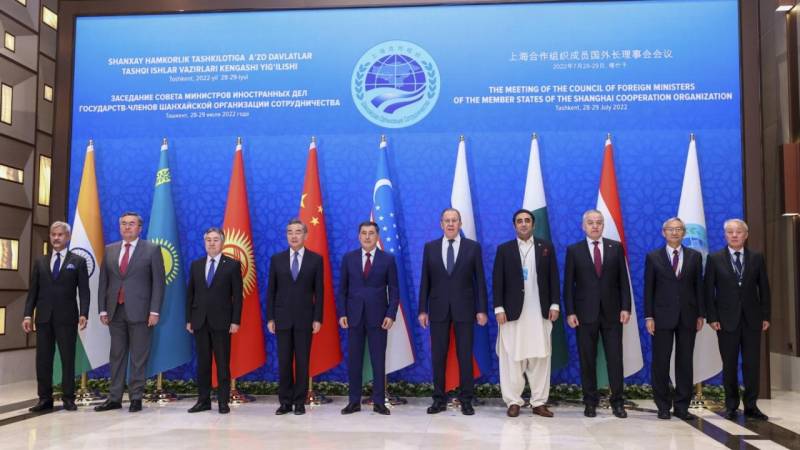Pakistan must participate in the SCO foreign minister’s moot in India

Stay tuned with 24 News HD Android App

The Modi government’s invite to Pakistani foreign minister Bilawal Bhutto and Chief Justice of Pakistan Omar Bandial to participate in the Shanghai Cooperation Organization’s (SCO) foreign ministers’ meeting in May and the jurist conference in March, was to stir up some excitement, perhaps more expectation. With Pakistan and India's turbulent and tense relations at the moment, any news regarding interaction inevitably leads to speculation and conjecture. Given the global stage, there is a great deal of significance of the two nuclear armed neighbors from an economic, human development, ideological, political, regional connectivity, strategic, geostrategic, diplomatic and environmental perspective. Therefore, the high expectations of a possible breakthrough in ties is unsurprising.
First the invite itself. The invite is a routine invitation that any country holding the one-year rotational presidency of the SCO is obliged to extend to all member states. India holding the current rotational presidency, has therefore invited Pakistan. To interpret this invite therefore as signaling a thaw between the two estranged nuclear-armed neighbours is premature and incorrect. Equally, it would be incorrect to link this to India reciprocating the Pakistani Prime Minister’s comments on Pakistan-India relations, where he retracted Pakistan's decision on no dialogue with India until New Delhi retraced its illegal August 2019 steps in Indian-administered Jammu & Kashmir. In his Al-Arabiya interview, Sharif expressed hope for improved Pakistan-India ties having “learnt a lesson” from wars.
Pakistan's response to India’s SCO invite is as inevitable as the Indian invite, which was less an act of policy than an SCO rule. Host countries are bound by the SCO charter to invite all member countries.
Similarly, for Pakistan participating in the SCO events will be inevitable since it views the SCO as an important Eurasian platform and forum with immense potential for promoting Pakistan's geostrategic, trade and economic interests within a multilateral context. Pakistan is also expanding its diplomatic outreach towards Eurasia.
Pakistan became a member in 2017 and with China and Russia as its 2001 founding members, SCO is now emerging as Asia’s flagship organization. As an expanding organization, it is covering Asia in all directions, Central, South, South-West and South-East Asia. Its nine dialogue partners include Saudi Arabia, Qatar, Egypt, Turkey, Nepal Cambodia and Armenia, while countries with an observer status include Cambodia, Armenia, Mongolia, Iran and Afghanistan.
Significantly, the original five-member Shanghai Five of 2001 by virtue of its geographical spread and population strength, SCO is the world’s largest organization facilitating a rising Asia by enhancing human development, technology, trade, cooperation and stability.
Pakistan will unlikely miss any key SCO event, but the question is the nature of participation. Will it be in person or virtual? India’s 2015 onwards policy of preventing senior Pakistani officials from meeting the Kashmiri All Pakistan Hurriyet Conference (APHC) members will put Pakistan in a difficult diplomatic and political situation. Although the moot is taking place on Indian soil, it is a multilateral event so Pakistan could technically participate in person... but it’s not an easy situation.
Interestingly, in 2015 too, a Pakistan-India near-détente occurred in Ufa on the sidelines of an SCO summit. Strained bilateral relations got a boost when a meeting between Prime Ministers Nawaz Sharif and Modi produced the Ufa statement, essentially a timeline for bilateral engagement.
However, within days of its signing, when Pakistan's National Security Advisor Sartaj Aziz was to arrive in Delhi to meet his counterpart, India announced that Aziz would only be received in India if he cancelled his scheduled meeting with the Kashmiri leadership. Pakistan refused this Indian condition and Aziz cancelled his Delhi trip. It dashed hopes for a positive outcome from the Sharif-Modi Ufa meeting.
The same issue will likely come up during the FM’s India visit. With a high-level presence, there will be questions about how Pakistan engages with the APHC on Indian soil. The answer lies with the host country. Significantly, on the multilateral front, Pakistan has not vetoed all Pakistani participation. For example, in October 2022 according to the Indian media, despite problems in bilateral relations, Pakistan sent two mid-level officials from its foreign ministry to participate in the SCO national coordinators’ meeting convened in Delhi to discuss the SCO’s summit which India would host. Even within the SAARC framework, Pakistan attended conferences even when convened by Delhi.
Therefore, responding positively to the Indian invite is not the question. Only the form of participation is. The Covid era has introduced new modes of participation including actual, virtual and hybrid with physical and virtual participation. Hence, using already existing technology the world has witnessed virtual participation at important global summits too including the UNGA, G20, OIC, EU etc. Within our own region, there was virtual participation in bilateral and multilateral meetings including ECO, SAARC etc.
Finally, a key question is whether Pakistan's most likely participation in the SCO Foreign Minister’s moot will impact Pakistan-Indian bilateral relations. The answer is that virtual participation is unlikely to impact strained bilateral ties. For that, India will have to retrace some of its steps in Jammu and Kashmir from August 2019.
Courtesy Arab News
